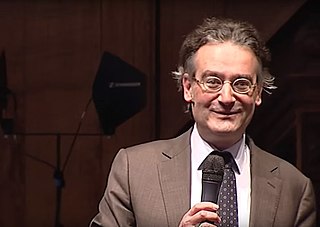
Utrecht is the fourth-largest city of the Netherlands, as well as the capital and the most populous city of the province of Utrecht. The municipality of Utrecht is located in the eastern part of the Randstad conurbation, in the very centre of mainland Netherlands, and includes Haarzuilens, Vleuten and De Meern. It has a population of 361,699 as of December 2021.

The Royal Netherlands Academy of Arts and Sciences is an organization dedicated to the advancement of science and literature in the Netherlands. The academy is housed in the Trippenhuis in Amsterdam.

The University of Amsterdam is a public research university located in Amsterdam, Netherlands. Established in 1632 by municipal authorities, it is the fourth-oldest academic institution in the Netherlands still in operation.

Robertus Henricus "Robbert" Dijkgraaf, is a Dutch theoretical physicist, mathematician and string theorist, and the Minister of Education, Culture and Science in the Netherlands from 2022 until 2024. From July 2012 until his inauguration as a minister, he had been the director and Leon Levy professor at the Institute for Advanced Study in Princeton, New Jersey, and a tenured professor at the University of Amsterdam.

Femke Halsema is a Dutch politician and filmmaker. On 27 June 2018, she was appointed Mayor of Amsterdam and began serving a six-year term on 12 July 2018. She is the first woman to hold the position on a non-interim basis. She previously was a member of the House of Representatives for the leftist green party, GroenLinks from 1998 to 2011, and served as the party's parliamentary leader from 2002 to 2010.

Frits van Oostrom is university professor for the Humanities at Utrecht University. In 1999 he was a visiting professor at Harvard for the Erasmus Chair. From September 2004 to June 2005, he was a fellow of the Netherlands Institute for Advanced Study (NIAS). He was awarded the Spinozapremie in 1995. In May 2005 he became president of the Royal Netherlands Academy of Arts and Sciences (KNAW) for a three-year period. He had been member of the same institution since 1994.

Dutch art describes the history of visual arts in the Netherlands, after the United Provinces separated from Flanders. Earlier painting in the area is covered in Early Netherlandish painting and Dutch and Flemish Renaissance painting.

The Netherlands Institute for Advanced Study in the Humanities and Social Sciences (NIAS) in Amsterdam, Netherlands, is an independent research institute in the field of the humanities and social and behavioural sciences founded in 1970. The institute offers advanced research facility for international scholars of all of the humanities and social sciences. It is a member of Some Institutes for Advanced Study (SIAS) and the Network of European Institutes for Advanced Studies (NetIAS).
Johannes Gerardus Franciscus (Jan) Veldhuis is a Dutch administrator/governor in the fields of scientific education and research, healthcare and culture, nationally and internationally. His last post was president of Utrecht University, from 1986 until 2003. He still holds various part-time governance positions.
Van Oostrum is a Dutch toponymic surname. Among variant forms are (van) Oosterom and (van) Oostrom. The name usually indicates an origin in the former village Oostrum near Houten, Utrecht. Some families may be linked to Oostrum, Friesland or Oostrum (Limburg) instead. Notable people with the surname include:

Meindert Fennema was a Dutch political scientist and Emeritus Professor of political science, who was attached to the Department of Political Science and the Institute for Migration and Ethnic Studies of the University of Amsterdam, where he held the chair on Political Theory of Ethnic Relations.

Naomi Ellemers is a distinguished professor of social psychology at Utrecht University since September 2015.

Eppo Egbert Willem Bruins is a Dutch politician and physicist. He has been serving as Minister of Education, Culture and Science in the Schoof cabinet since July 2024 on behalf of New Social Contract (NSC). He was a member of the House of Representatives for the Christian Union (CU) from 2015 to 2021.

Balthassar Jozef Paul "Bas" van Bavel is a Dutch historian. He has held the chair of Transitions of Economy and Society at Utrecht University since 2011, and has been professor of Economic and Social History since 2007. His research has mostly focused on pre-industrial Northwestern Europe. He was one of the winners of the 2019 Spinoza Prize, the highest award in Dutch science.

Jansje Gretha (Jans) Schuiringa, also known as Miss Schuiringa, was one of the first people in the Netherlands to hold the title of dentist. The work that Schuiringa carried out between 1920 and 1957 as a professor of prosthetic dentistry at the Institute of Dentistry in Utrecht, was of major significance in the development of the discipline of maxillofacial dental surgery. Maxillofacial dental surgery, which operates on the jaw and the face, involves making prosthetics for the face and teeth.
Carel Hendrik Blotkamp is a Dutch artist, art historian, writer and critic. He was a professor at the Vrije Universiteit Amsterdam between 1982 and 2007. Apart from his academic career Blotkamp is known for his work in art critique, writing for several newspapers and magazines. He also co-founded several art magazines. Blotkamp is considered an authority on De Stijl and magic realism, and wrote several books on modern artists.

Dirk Jan"Dick"van de Kaa is a Dutch demographer. From 1970 to 1987 he was the first director of the Netherlands Interdisciplinary Demographic Institute. From 1987 to 1995 he was director and rector of the Netherlands Institute for Advanced Study. Van de Kaa was professor of demography at the University of Amsterdam between 1978 and 1998.
Marinus Johannes Richardus "Rinus" Wortel is a Dutch geophysicist. He was professor of tectonophysics at Utrecht University between 1989 and 2012. Since 2013 he has been unpaid professor of geophysics at the same university.













